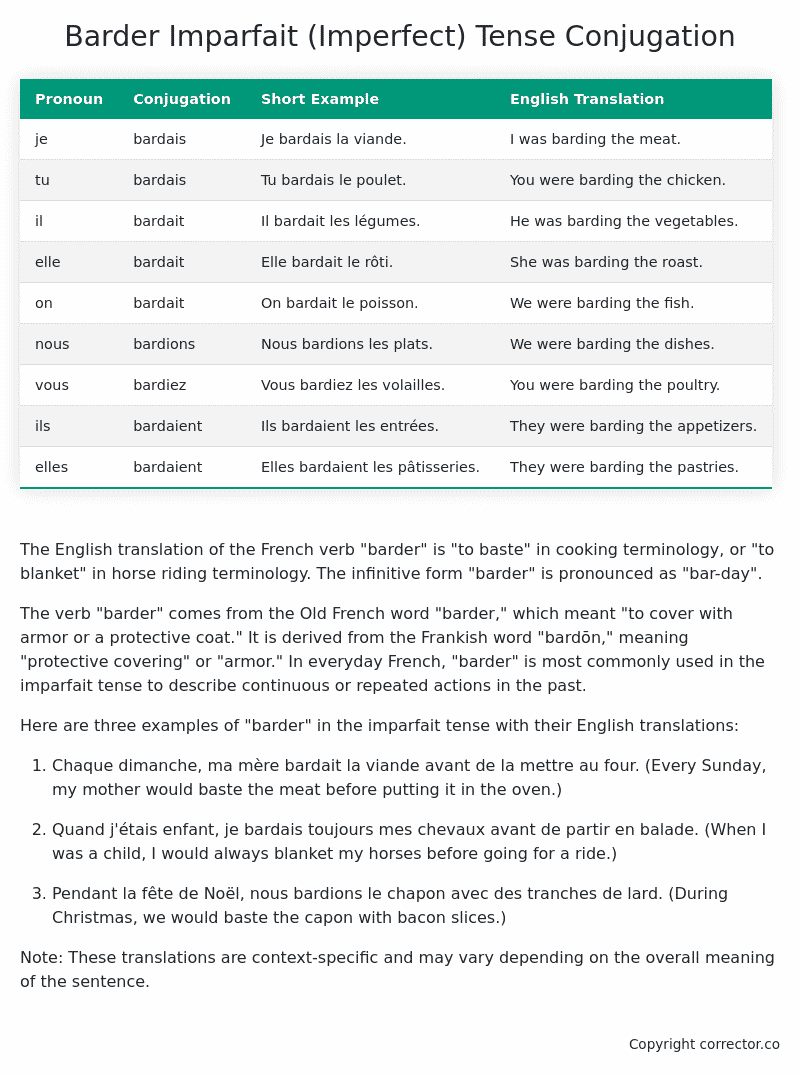Imparfait (Imperfect) Tense Conjugation of the French Verb barder
Introduction to the verb barder
The English translation of the French verb “barder” is “to baste” in cooking terminology, or “to blanket” in horse riding terminology. The infinitive form “barder” is pronounced as “bar-day”.
The verb “barder” comes from the Old French word “barder,” which meant “to cover with armor or a protective coat.” It is derived from the Frankish word “bardōn,” meaning “protective covering” or “armor.” In everyday French, “barder” is most commonly used in the imparfait tense to describe continuous or repeated actions in the past.
Here are three examples of “barder” in the imparfait tense with their English translations:
-
Chaque dimanche, ma mère bardait la viande avant de la mettre au four.
(Every Sunday, my mother would baste the meat before putting it in the oven.) -
Quand j’étais enfant, je bardais toujours mes chevaux avant de partir en balade.
(When I was a child, I would always blanket my horses before going for a ride.) -
Pendant la fête de Noël, nous bardions le chapon avec des tranches de lard.
(During Christmas, we would baste the capon with bacon slices.)
Note: These translations are context-specific and may vary depending on the overall meaning of the sentence.
Table of the Imparfait (Imperfect) Tense Conjugation of barder
| Pronoun | Conjugation | Short Example | English Translation |
|---|---|---|---|
| je | bardais | Je bardais la viande. | I was barding the meat. |
| tu | bardais | Tu bardais le poulet. | You were barding the chicken. |
| il | bardait | Il bardait les légumes. | He was barding the vegetables. |
| elle | bardait | Elle bardait le rôti. | She was barding the roast. |
| on | bardait | On bardait le poisson. | We were barding the fish. |
| nous | bardions | Nous bardions les plats. | We were barding the dishes. |
| vous | bardiez | Vous bardiez les volailles. | You were barding the poultry. |
| ils | bardaient | Ils bardaient les entrées. | They were barding the appetizers. |
| elles | bardaient | Elles bardaient les pâtisseries. | They were barding the pastries. |
Other Conjugations for Barder.
Le Present (Present Tense) Conjugation of the French Verb barder
Imparfait (Imperfect) Tense Conjugation of the French Verb barder (You’re reading it right now!)
Passé Simple (Simple Past) Tense Conjugation of the French Verb barder
Passé Composé (Present Perfect) Tense Conjugation of the French Verb barder
Futur Simple (Simple Future) Tense Conjugation of the French Verb barder
Futur Proche (Near Future) Tense Conjugation of the French Verb barder
Plus-que-parfait (Pluperfect) Tense Conjugation of the French Verb barder
Passé Antérieur (Past Anterior) Tense Conjugation of the French Verb barder
Futur Antérieur (Future Anterior) Tense Conjugation of the French Verb barder
Subjonctif Présent (Subjunctive Present) Tense Conjugation of the French Verb barder
Subjonctif Passé (Subjunctive Past) Tense Conjugation of the French Verb barder
Subjonctif Imparfait (Subjunctive Imperfect) Tense Conjugation of the French Verb barder
Subjonctif Plus-que-parfait (Subjunctive Pluperfect) Tense Conjugation of the French Verb barder
Conditionnel Présent (Conditional Present) Tense Conjugation of the French Verb barder
Conditionnel Passé (Conditional Past) Tense Conjugation of the French Verb barder
Conditionnel Passé II (Conditional Past II) Tense Conjugation of the French Verb barder
L’impératif Présent (Imperative Present) Tense Conjugation of the French Verb barder
L’impératif Passé (Imperative Past) Tense Conjugation of the French Verb barder
L’infinitif Présent (Infinitive Present) Tense Conjugation of the French Verb barder
L’infinitif Passé (Infinitive Past) Tense Conjugation of the French Verb barder
Le Participe Présent (Present Participle) Tense Conjugation of the French Verb barder
Le Participe Passé (Past Participle) Tense Conjugation of the French Verb barder
Struggling with French verbs or the language in general? Why not use our free French Grammar Checker – no registration required!
Get a FREE Download Study Sheet of this Conjugation 🔥
Simply right click the image below, click “save image” and get your free reference for the barder imparfait tense conjugation!

Barder – About the French Imparfait Tense
NOTE: To take a deep dive into all the French tenses then see our article on Mastering French Tense Conjugation.
Formation of the Imparfait Tense
For regular -er verbs:
For regular -ir verbs
For regular -re verbs
Common Everyday Usage Patterns
Description of Past Habits
Background Information
Mental and Emotional States
It’s employed to express emotions, thoughts, or physical sensations in the past. For example: “J’étais content quand il est arrivé.” (I was happy when he arrived.)
Ongoing Actions
Points to Note About the Imparfait Tense
Passé Composé vs. Imparfait
Conditional
Si Clauses
Narration
I hope you enjoyed this article on the verb barder. Still in a learning mood? Check out another TOTALLY random French verb imparfait conjugation!


